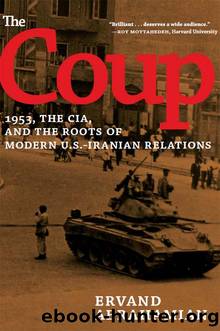The Coup by Ervand Abrahamian

Author:Ervand Abrahamian [Abrahamian, Ervand]
Language: eng
Format: epub
ISBN: 9781595588623
Publisher: New Press, The
July Uprising
Mossadeq handed in his resignation on July 16. A closed session of the Majles—with Mossadeq supporters boycotting the meeting—immediately offered the premiership to Qavam. The vote was 40, with 2 abstentions. The 40 probably included Baqai, Makki, and Haerizadeh. Qavam wasted no time accepting the offer and consulting the British embassy on the composition of his cabinet. He also offered to reopen oil negotiations.203 In a radio address to the nation, he began by boasting that he had initiated the oil nationalization campaign in 1947. He went on to promise to settle the problem as soon as possible by being “more flexible and prudent.” He ended by denouncing troublemakers, demagogues, street politicians, and “hypocrites who under the guise of fighting red extremism undermine the constitution and instead strengthen black reaction and outdated superstitions.” It was rumored that he had been offered American aid. It was also rumored that he had issued an arrest warrant for Kashani. Hassan Arsanjani, Qavam’s adviser, admitted that the speech had been a major blunder, forcing Kashani back into Mossadeq’s fold.204 Not surprisingly, Kashani joined the National Front and the bazaar guilds in calling for mass protests. He proclaimed “foreign powers were using Qavam to undermine the nation’s religion, freedom, and independence.” 205
The call for mass protests was seconded by the Tudeh Party. This was the first time the Tudeh had come out in full support of Mossadeq. The party called for a nationwide general strike and urged supporters to pour into the streets. The British embassy estimated more than 90 percent of organized labor in Tehran, especially in industry, heeded the Tudeh call.206 Immediately after the uprising, Kashani thanked the Tudeh for helping bring “victory against British imperialism.” 207 Both Fateh and Arsanjani—neither of whom by any stretch of the imagination could be described as pro-Tudeh—credited the party for playing the crucial role in the whole uprising.208 This reflected major change in Tudeh policy. Until then, ultra-leftists had dominated the leadership and had tended to label Mossadeq as a pro-American “lackey.” From that point on, more pragmatic leaders, notably Nuraldin Kianuri, held the majority in the central committee and tended to see Mossadeq as “an anti-imperialist patriot.” 209
The crisis came to a head on July 21. After three days of intermittent protests and work stoppages, especially in the bazaars, most cities were shaken on that day by general strikes and massive demonstrations. Tehran began the day ominously quiet—almost all offices, shops, markets, factories, buses, and taxis were at a standstill. Even shops in the wealthier northern neighborhoods were shuttered. By late morning, demonstrators from the southern working-class districts as well as the central bazaar converged on Parliament Square. They were surrounded there by troops, trucks, and tanks. For five hours, the capital was in complete turmoil. One of the shah’s brothers was nearly lynched when his chauffeur took a wrong turn into an angry crowd. A statue of Reza Shah was toppled. A deputy was pelted with stones when he tried to persuade the crowd that the problem could be solved peacefully.
Download
This site does not store any files on its server. We only index and link to content provided by other sites. Please contact the content providers to delete copyright contents if any and email us, we'll remove relevant links or contents immediately.
| Arms Control | Diplomacy |
| Security | Trades & Tariffs |
| Treaties | African |
| Asian | Australian & Oceanian |
| Canadian | Caribbean & Latin American |
| European | Middle Eastern |
| Russian & Former Soviet Union |
The Secret History by Donna Tartt(16617)
The Social Justice Warrior Handbook by Lisa De Pasquale(11489)
Thirteen Reasons Why by Jay Asher(7785)
This Is How You Lose Her by Junot Diaz(5764)
Weapons of Math Destruction by Cathy O'Neil(5034)
Zero to One by Peter Thiel(4823)
The Myth of the Strong Leader by Archie Brown(4789)
Promise Me, Dad by Joe Biden(4444)
Stone's Rules by Roger Stone(4415)
Beartown by Fredrik Backman(4411)
How Democracies Die by Steven Levitsky & Daniel Ziblatt(4396)
The Fire Next Time by James Baldwin(4340)
100 Deadly Skills by Clint Emerson(4075)
A Higher Loyalty: Truth, Lies, and Leadership by James Comey(4031)
Rise and Kill First by Ronen Bergman(4012)
The David Icke Guide to the Global Conspiracy (and how to end it) by David Icke(3880)
The Farm by Tom Rob Smith(3871)
Secrecy World by Jake Bernstein(3782)
The Doomsday Machine by Daniel Ellsberg(3730)
